Wednesday, July 4th 2018

TechPowerUp Processor Survey Results: The Ryzen Effect is Real
Late May 2018, TechPowerUp started a front-page poll asking people which processor they use. 37 days and 16,140 responses later, we have a general idea of where the desktop processor market stands among our readers (predominantly PC gamers and enthusiasts). The top-two responses to our survey were 4th generation Core "Haswell," followed by the preceding two generations ("Ivy Bridge" and "Sandy Bridge"). This speaks volumes as to the hole Intel dug itself into, due to lack of competition from AMD. Processors that are 4-7 years old still run today's gaming PCs, and don't bottleneck today's games, as long as graphics cards keep getting faster (where there has been relatively more competition than the CPU market).
Despite being newer, fewer respondents use 6th generation "Skylake" and 7th generation "Kaby Lake" processors than older generations, because those on something like 4th generation "Haswell" or even "Ivy Bridge," don't see the value in upgrading. But then something changed in 2017 - AMD became competitive again, and forced an increase in CPU core counts across the segment. AMD's Ryzen processor family, including both its 1st and 2nd generations, are better received in the market than Intel's competing 8th generation "Coffee Lake" and 7th generation "Kaby Lake." The data stands to validate the "Ryzen effect," the idea that the introduction of Ryzen disrupted Intel's near-monopoly, increased core-counts, and brought innovation back to the segment.More of our readers use AMD Ryzen processors than Intel Core "Coffee Lake" and "Kaby Lake." So in the period following Intel's launch of 7th generation "Kaby Lake" (slightly before the launch of Ryzen), more AMD processors were installed among our readers. This of course doesn't mean that there are more AMD users, since we're not counting pre-Ryzen Intel generations such as "Skylake" and "Haswell." This seems to suggest that the "Ryzen effect" is not a myth.In the time since 2nd generation "Sandy Bridge" (circa 2012), very little innovation has been there from Intel for PC gamers. The mainstream-desktop segment has had to content with no more than 4 cores, and there's been very little IPC increments between generations to warrant upgrades. The result is that there are plenty of people with >4 year old processors, which are fast enough for today's gaming. The data also shows that in a shorter span of time, AMD sold more Ryzen chips.Of course there are limitations to our survey. The data is sourced from a user poll among our readers, in contrast to the Steam Hardware Survey, which gets its data by probing the hardware of a machine. As we mentioned earlier, our readers are composed of PC gamers and enthusiasts, and hence our data isn't in line with the general market (that includes other use-cases).
Despite being newer, fewer respondents use 6th generation "Skylake" and 7th generation "Kaby Lake" processors than older generations, because those on something like 4th generation "Haswell" or even "Ivy Bridge," don't see the value in upgrading. But then something changed in 2017 - AMD became competitive again, and forced an increase in CPU core counts across the segment. AMD's Ryzen processor family, including both its 1st and 2nd generations, are better received in the market than Intel's competing 8th generation "Coffee Lake" and 7th generation "Kaby Lake." The data stands to validate the "Ryzen effect," the idea that the introduction of Ryzen disrupted Intel's near-monopoly, increased core-counts, and brought innovation back to the segment.More of our readers use AMD Ryzen processors than Intel Core "Coffee Lake" and "Kaby Lake." So in the period following Intel's launch of 7th generation "Kaby Lake" (slightly before the launch of Ryzen), more AMD processors were installed among our readers. This of course doesn't mean that there are more AMD users, since we're not counting pre-Ryzen Intel generations such as "Skylake" and "Haswell." This seems to suggest that the "Ryzen effect" is not a myth.In the time since 2nd generation "Sandy Bridge" (circa 2012), very little innovation has been there from Intel for PC gamers. The mainstream-desktop segment has had to content with no more than 4 cores, and there's been very little IPC increments between generations to warrant upgrades. The result is that there are plenty of people with >4 year old processors, which are fast enough for today's gaming. The data also shows that in a shorter span of time, AMD sold more Ryzen chips.Of course there are limitations to our survey. The data is sourced from a user poll among our readers, in contrast to the Steam Hardware Survey, which gets its data by probing the hardware of a machine. As we mentioned earlier, our readers are composed of PC gamers and enthusiasts, and hence our data isn't in line with the general market (that includes other use-cases).
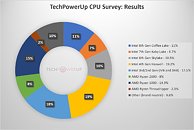
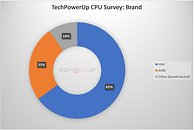
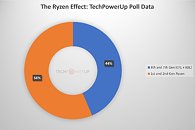
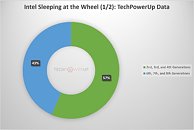
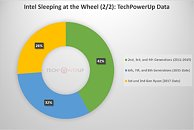

96 Comments on TechPowerUp Processor Survey Results: The Ryzen Effect is Real
To which kind of businesses you sell? Retailers or companies? If the latter then thats also not the complete picture.
Companies buy office hardware which is still in the most cases Intel. Just because there is a wider range of options and they dont trust Ryzen yet.
Its normal that adoption takes longer in the IT departments of bigger companies.
Stop fooling yourself
1- Quantify what % of TPU users are not AMD users and then,
2 - Of that subset, quantify what % are vehemently anti -AMD.
From that, then define, 'hatred'.
Stupid statement is stupid, frankly. :shadedshu:
As for other points in the thread about being enthusiasts - I totally agree. I knew moving to AMD with a new CPU and mobo would have some teething issues (I read the reviews) but I wanted a challenge. I know a fast 4 core intel is better than my chip for 90% of games but I don't care. I game at 60Hz and I use a 1080ti. I wanted to try an AMD chip and guess what - it's a damn fine piece of silicon. OK, it's not as fast and my FPS won't be as high but it's higher than my refresh rate and it was fun building the system.
Intel still wins for gaming scenarios but sometimes it's nice to experiment with a new thing and the Zen architecture is the best thing AMD have created for a long time. Enthusiasts don't necessarily buy the fastest, they buy what challenges, or what takes their fancy.
I know my statement annoys the hell out of most on here but please understand it's not directed towards everyone and not with regards to the current state of affairs.Well I have to disagree with the way you classify users.
I own a Nvidia GPU yet I have been simultaneously called out for hating Nvidia and being an AMD fanboy. Your rather primitive way to classify people would have failed on me. :)
Primitive? It's factual. If you hate (rather, a person) hated AMD you wouldn't own their hardware. From that, you then see who hates them. But you need to define hate.
What I am saying is, it's very hard to define a forum of haters without figuring the above out. Not primitive at all.
The poll seemed to only be meant to give a general idea of Ryzen market penetration among TPU users. It was not meant to be definitive, because if it was it would be a deeply flawed poll. TPU is smarter than that.Rubbish. There are those who are in each extreme here on TPU, but most users are generally objective minded and look at things realistically.Citation please? Prove people are lying.Couldn't agree more.They're doing that now. AMD is currently giving Intel humble-pie very handily. And THIS IS GOOD FOR EVERYONE!
Competition always drives innovation and creative thinking in a given marketplace. Intel will not just cower in a corner. They will come back with something that will answer AMD's new hotness. And the cycle will continue. We all will benefit.
Shocking
Your thought process goes like this :
Own something from X ? If yes then you can't hate X , if no then there is chance you do. Not only that such a logic is as basic as it can get , than in it self isn't a problem , it's just that it simply isn't true all the time. You can definitely dislike something even if you use/own said thing.
Out of curiosity after reading many of my comments on this site, how do you categorize me based on this algorithm of yours ?I don't have to prove anything because I didn't said people were , in fact, lying , read carefully what I wrote. People consider this survey to be irrelevant/inaccurate, my observation was that even if people would have lied , the result as it is would still be telling.
Dude , let it go, seriously. I made no accusation.
Well done, AMD!
But some of us still use Vishera/Bulldozer based CPUs from AMD. Would have been nice to include that in the poll. :-)
As for my future plans.. Threadripper 2 later this year.... Barring any premature failures on my current rig. Budgeting $1500 for it. (CPU/RAM/Mainboard)
Hating or favorizing one over the other it's not just retarded, but overly dumb and stupid.
Thus again we arrive at the question; What evidence do you have to suggest that anyone on TPU "would" be dishonest about an answer to a poll? You can't throw out a statement that serious about your fellow community members without being willing to justify same or getting a bit a flack for saying it.
I also find it amusing how AMD is eating Intel's lunch with Threadripper. Intel created the HEDT market to pad their coffers but it's AMD who now has the most compelling platform for it, especially with 24/32-core TR 2 arriving soon. Intel made fun of AMD's "glue" approach but it is now reaping major dividends for AMD (Intel may have to soon consider using their own glue to compete, as even their largest Xeon chip can only accommodate up to 28 cores).
All in all, it's a glorious time to be an enthusiast. It's nice to see competition back in the CPU market, and all of us benefit from it. Now if only AMD can raise their game in the GPU market then things would be perfect. Here's hoping.